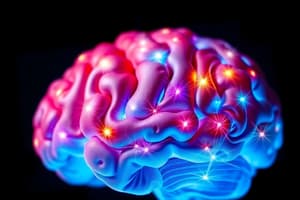Podcast
Questions and Answers
Match the following psychologists with their associated concepts or theories:
Match the following psychologists with their associated concepts or theories:
William James = Functionalism Edward Titchener = Structuralism Wilhelm Wundt = Elemental approach to psychology B.F. Skinner = Behaviorism
Match the following terms related to functionalism with their descriptions:
Match the following terms related to functionalism with their descriptions:
Consciousness = Everyday occurrences in an indirect contrast to elemental approaches Mental states = Constituted by their causal relationships Software programs = Organization of the brain's functions Active engagement = Importance in understanding mental processes
Match the following concepts with their definitions related to functionalism:
Match the following concepts with their definitions related to functionalism:
Learning = Usefulness of mental abilities in functionalism Perception = Focus of psychology as proposed by James Computation = Brain's processing of inputs to produce behaviors Thwarting = External forces that provoke thought
Match the following contributions to psychology with their originators:
Match the following contributions to psychology with their originators:
Match the following principles of functionalism with their implications:
Match the following principles of functionalism with their implications:
Flashcards are hidden until you start studying
Study Notes
Structuralism
- Edward B. Titchener (1867-1927) is attributed with developing structuralism as an approach to study internal mental processes.
- Titchener defined psychology as the analytic study of the generalized adult normal human mind through introspection.
- To him, the subject of psychology is immediate human experiences, and the main occupation of practicing psychologists is to discover the elements and how they are compounded.
- Structuralism became popular in Germany in the 1890s among young psychologists, who sought to explain mental processes by studying elements.
- Titchener argued that psychology and consciousness can be studied by breaking them down into minute parts and then systematically studying them.
Consciousness and the Human Mind
- To Titchener, consciousness is the sum total of a person's experiences at any given time.
- The mental elements are the focus of any study.
- Titchener later divided psychology into various areas, including child, animal, abnormal, and human psychology.
- He believed that the main objective of psychology is to study and understand the human mind and structure by isolating elemental processes from the complexity of consciousness.
Functionalism
- William James (1842-1910) led the development of functionalism as an approach to understanding internal mental processes at Harvard University.
- Functionalism advocates that engagement with activity is important for explaining what goes on in mental processes.
- Thinking takes place when an organism is thwarted by some external force or obstacle, such as in a problematic situation.
- Functionalism views the brain as a physical device with mental substrates that perform computations on inputs, producing behaviors.
- William James was concerned with the effective functions of the brain through its organization, or 'software programs'.
- He argued that mental states are constituted by their casual relationships to one another and to sensory inputs and behavioral outputs.
Key Points of Functionalism
- Psychology as a science should focus on the usefulness of mental abilities, such as learning or perception.
- Consciousness is an everyday occurrence, in contrast to the elemental approach of Wundt.
- William James' publications on functionalism opened up more opportunities for other psychologists interested in mental processes, particularly human behavior.
Studying That Suits You
Use AI to generate personalized quizzes and flashcards to suit your learning preferences.




